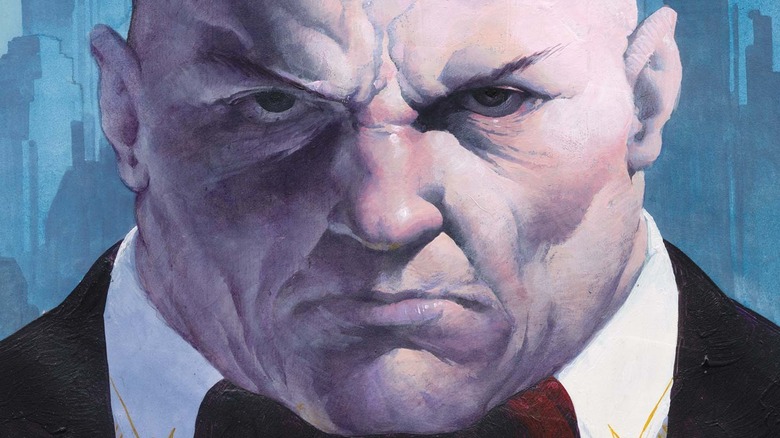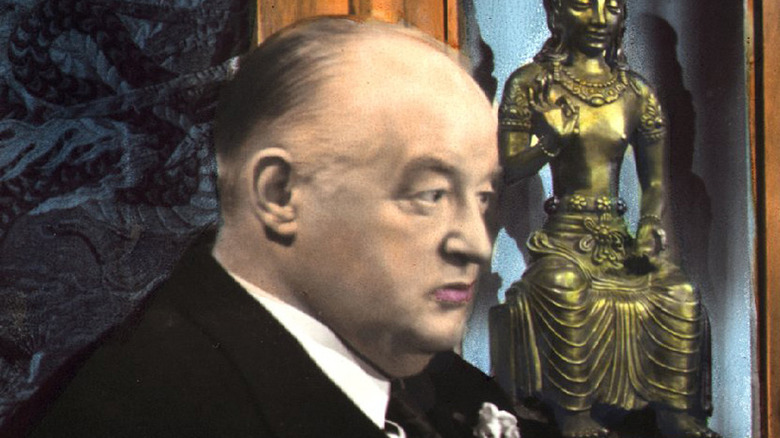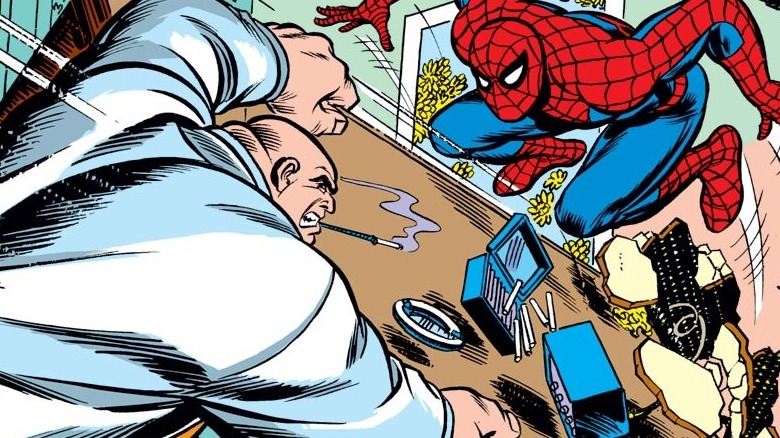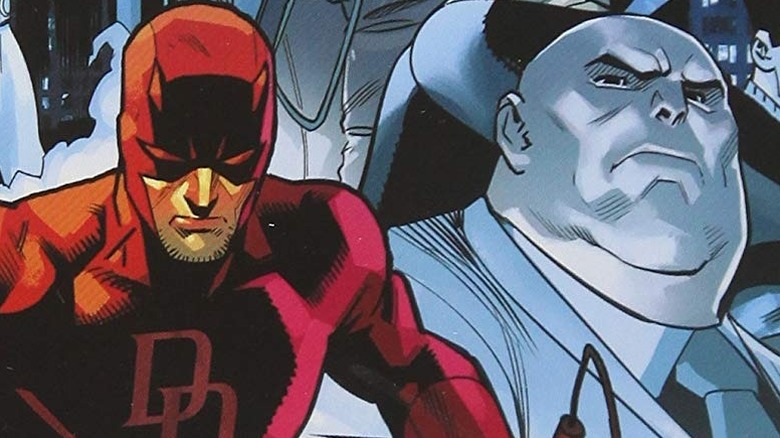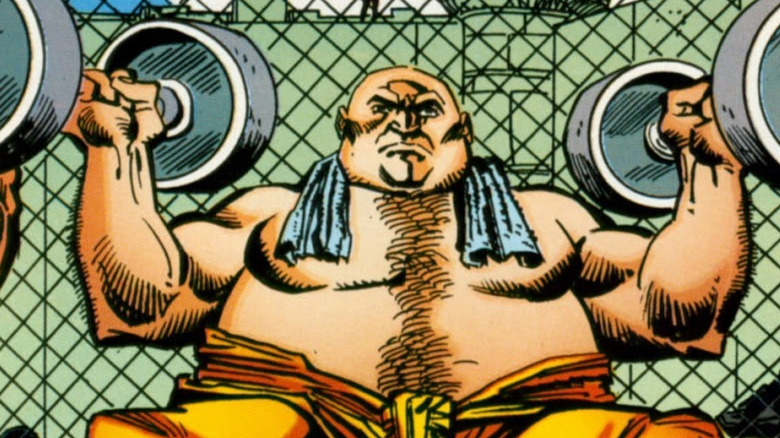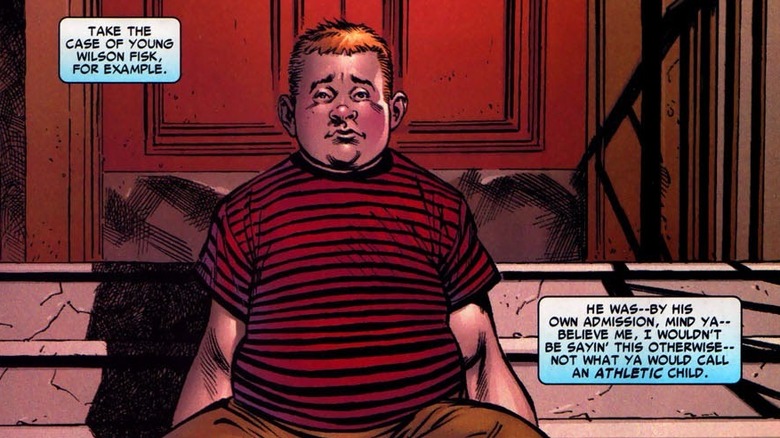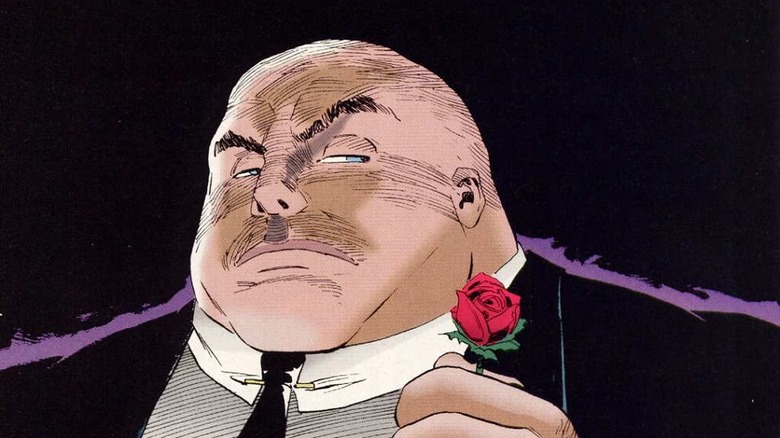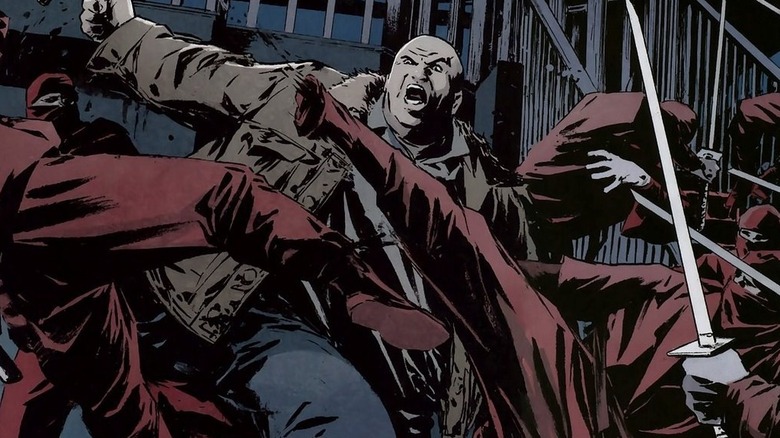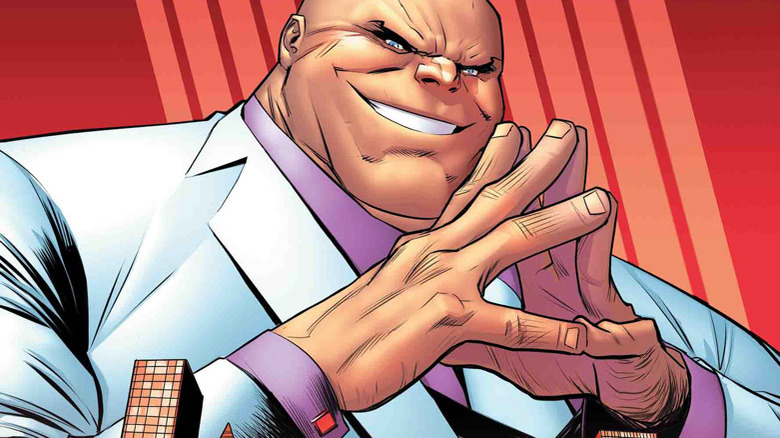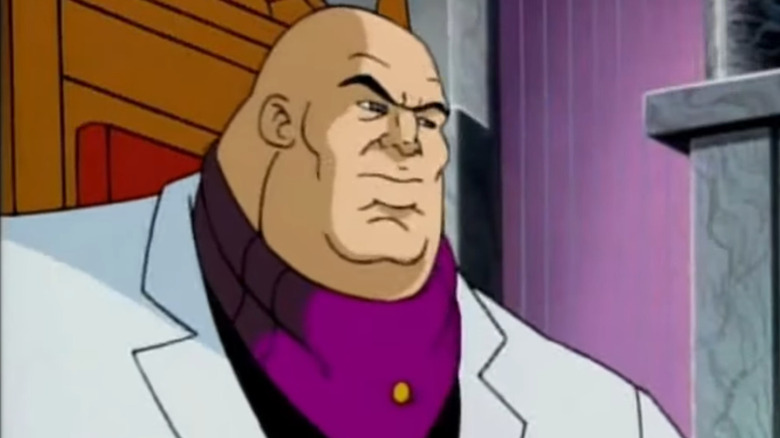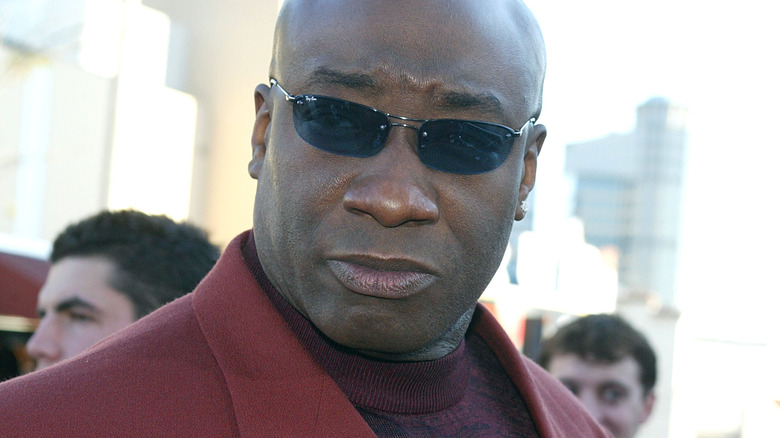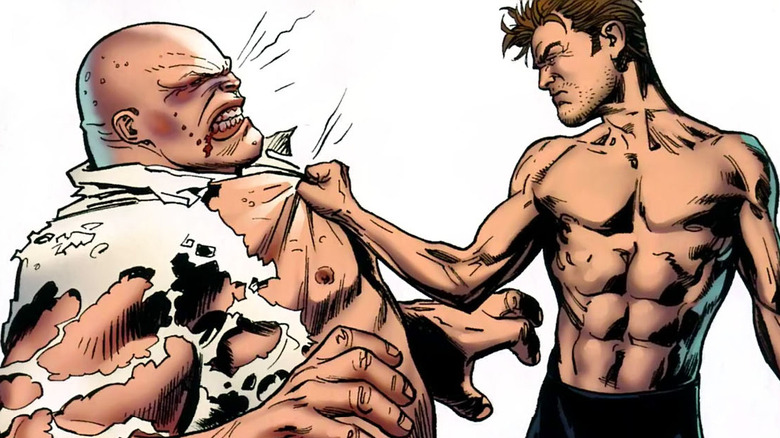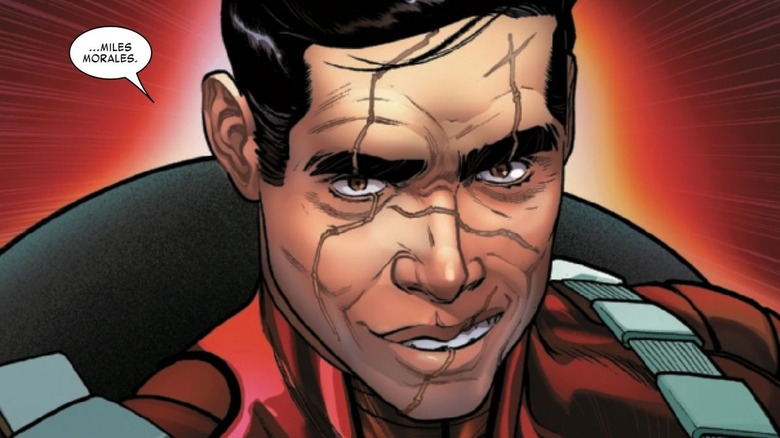The Untold Truth Of Marvel's Kingpin
Given the number of super-powered do-gooders running around the Marvel universe, a regular human would be foolish to pull off criminal acts that might attract their attention. After all, even the bad guys with powers routinely have trouble dealing with their costumed foes. What chance does a normal person with no super-speed, laser beams, or psychic powers stand against the likes of the X-Men or the Avengers?
This simple fact hasn't stopped the most irredeemable crooks from committing to a life of crime, however. No wonder there's no shortage of evildoers — or in most cases, superhero punching bags — in the Marvel stable. But among these hardened criminals, few have achieved the level of wealth and success Wilson Grant Fisk, otherwise known as the Kingpin, has.
Throughout his colorful, decades-long comic book career, the Kingpin has been a small-time thug, a less-than-legitimate businessman, the leader of an ancient ninja cult, and even a public servant. However, he is best known for two things: Being the boss of New York City's criminal underworld, and being the biggest and most persistent thorn in Daredevil's side. This is the untold truth of the Kingpin, a seemingly ordinary American citizen who's caused no end of grief and chaos in the lives of Marvel's greatest heroes.
Kingpin's design was inspired by Hollywood
On paper, the Kingpin's design may sound like a forgettable, generic "mob boss" look. He's a bald, bulky man in a business suit, wielding a diamond-tipped cane and a perpetually serious expression. In action, though, the character's impressive frame cuts an iconic silhouette. Interestingly enough, the Kingpin's signature look was reportedly inspired by not one, but two real-life Hollywood stars.
In "Spider-Man Chronicle: A Year by Year Visual History," Alan Cowsill, a former editor for Marvel UK, reveals that Kingpin's overall look was inspired by "Casablanca” star Sydney Greenstreet (via Downthetubes). The other American actor said to have served as the inspiration for Fisk's appearance was Robert Middleton, an actor best known for his villainous roles (per "American Comic Book Chronicles: 1965-1969"). The amalgamation of these two Hollywood icons resulted in the Kingpin, who first reared his hairless head in 1967's "Amazing Spider-Man" #50.
Interestingly, according to Spider-Man co-creator Steve Ditko, Greenstreet almost ended up inspiring a different Spider-Man villain. In a 2002 essay (via Vulture), Ditko explains that Stan Lee preferred "heavy-set" bad guys, and pointed to Greenstreet as a "villain model." However, Ditko opposed this suggestion and chose to depict the high-flying Adrian Toomes as a slim septuagenarian instead of a girthy gangster.
He was originally a Spider-Man villain
Wilson Fisk could not have picked a better time to debut in the Marvel universe: His first appearance arrives right after Spider-Man (temporarily) decides to hang up his webs.
Up until the moment the webslinger discards his costume in a trash can and disappears from the public eye, the Kingpin works small-time jobs, uneasily coexisting with the other gangs that compose New York's organized crime network. In Spider-Man's departure, Fisk sees the perfect opportunity to unite those groups under his command, in a bid to expand their operations beyond New York. However, this plan is ultimately foiled when Spider-Man, who realizes that the call for him to use his powers responsibly is just too strong to ignore, returns to action and puts a stop to it. The wall-crawler and the crime boss continue to tangle until the Kingpin eventually finds a different superhero to bedevil on a more consistent basis: Daredevil.
That said, Spider-Man and the Kingpin still clash from time to time, largely due to their overlapping bases of operations. In fact, their association with each other is strong enough for the Kingpin to be included in the 1997 inter-company crossover "Batman & Spider-Man: New Age Dawning." There, he's portrayed as the counterpart to Batman's Ra's al Ghul.
He hates Daredevil with a passion
Rarely does the Kingpin not have his ginormous hands in the cookie jar of crime, which is why it isn't surprising that he's run afoul of pretty much every major Earth-based hero in the Marvel universe. Among the spandex-clad crowd, no do-gooder has gotten under Fisk's skin quite like the adventuresome Daredevil, who is secretly the blind lawyer Matt Murdock. Over the years, the Man Without Fear and the Kingpin of Crime have developed an intense adversarial relationship founded on mutual loathing.
On numerous occasions, the Kingpin has managed to do damage to Daredevil's personal life in a way no other villain has. Perhaps the most noteworthy example takes place in the pages of 1986's "Daredevil" #227 to #230, in which Fisk puts Murdock through the wringer after discovering he's secretly Daredevil. Aside from making Murdock lose his license to practice law, he drains the disgraced lawyer's finances. Taking advantage of Daredevil's weakened psychological state, the Kingpin beats him within an inch of his life. In the end, however, Daredevil bounces back and rebuilds.
Later on, in 2006's "Daredevil" #81, Fisk manages to get Murdock arrested by the FBI for his vigilante activities, but ends up imprisoned alongside him. The foes are temporarily forced to work together to survive their shared experience, though only Daredevil eventually escapes imprisonment.
He's all muscle
Wilson Fisk's massive frame is hard to miss. Many of his opponents — especially those who have never faced him in combat — take a look at him and assume he never hits the gym. In reality, raw power lies beneath the Kingpin's tremendous bulk. He's so strong, he even gives enhanced individuals like Captain America and Daredevil a painful time.
According to 2004's "Official Handbook of the Marvel Universe: Daredevil," the Kingpin is 450 pounds of pure muscle. If you've ever seen a powerlifter, this won't be surprising news. The Kingpin still stops short of having superhuman strength, since this doesn't technically count as a superpower. Rather, he's at peak human power, even though the most stylized takes on his physical appearance may not give you that impression — "Spider-Man: Into the Spider-Verse," for example, depicts him as a gargantuan person who dwarfs nearly everyone around him. His elite hand-to-hand combat skills make him all the more terrifying to take on.
Another advantage of all that muscle is the fact that it makes him nearly impervious to pain or injury. A superhero's punch doesn't faze him the way it does an ordinary criminal — there's a wall of toned flesh between the good guy's knuckles and Fisk's organs, nerves, and bones.
He was bullied as a child
The Kingpin is a ruthless, cutthroat character who will use every single resource and advantage at his disposal to make life miserable for his opponents. One can argue that he learned to behave this way during his years as a small-time thug. As the muscle who handled his bosses' dirty work, he certainly learned to be unscrupulous. However, a closer look at his childhood reveals that his issues are far more deeply-rooted than that. The relentless bullying Fisk received as a young boy paved the way for him to become a big bully himself.
In the 2006 one-shot "Civil War: War Crimes," readers get a small glimpse of how Fisk was mistreated and maligned as a child. Having grown up poor and far from physically fit, the future Kingpin was ignored and sidelined by kids his age, who refused to invite him to play. Fisk reacted to this cruelty by quietly learning how to assert dominance over absolutely everyone. Eventually, it didn't matter that he wasn't brought in to play the other kids' games — he controlled games of his own. The fact that his vast criminal empire can be traced back to the loneliness of a kid being left behind on a stoop is surprising, yet utterly believeable.
He's given up crime for love
While Wilson Fisk may seem like an indomitable force of evil to his opponents, he has proven that he is, above all things, a hopeless romantic. As hard as it may be to believe, the Kingpin has even considered quitting the criminal game for good, all in the name of love.
In 1979's "Amazing Spider-Man" #197, the Kingpin and an injured Spider-Man engage in a brutal, no-holds-barred battle that ends with the criminal gaining the upper hand. Just as he's about to strike the killing blow, his wife Vanessa steps in. This forces him to choose between giving up his empire and ending the life of his hated foe. Fisk immediately surrenders and decides to start anew with Vanessa. At one point, he even provides intel to the authorities to help them round up other gang leaders.
This change of heart is short-lived, however, as the Kingpin is dragged back into the violent lifestyle he sought to leave. In 1981's "Daredevil" #171, Vanessa's apparent death prompts Kingpin to rebuild his criminal operations, becoming a formidable force in the underworld once again. This marks the first of Fisk's attempts to turn his back on crime, perhaps proving that this particular leopard will never be able to change his spots.
The Kingpin's ties to Japan
Though Wilson Fisk's operations are always primarily based in America, his criminal influence extends to many other parts of the world. On numerous occasions, he's shown that he's not above working with international groups like Hydra to achieve his ends. That said, Japan holds a special place in Wilson Fisk's heart. Not only is this the country where he first attempts to turn over a new leaf, it's also home to a fearsome criminal organization he temporarily takes control of.
During the Kingpin's first attempt at reform after the events of "Amazing Spider-Man" #197, he and his wife decide to start anew in Japan. However, criminal interference from those who want him back in the game cuts his retirement short. Soon enough, he finds himself back in the United States.
Much later, Daredevil takes control of the Hand, an ancient ninja organization, in order to reform it. He begins to display erratic and even villainous behavior, which worries his fellow street-level superheroes. This leads to a massive confrontation between the heroes and Daredevil's Hand ninjas inside Shadowland, a massive castle complex the criminal group has established in New York. In the aftermath of this battle, the Kingpin is able to usurp Daredevil's leadership, becoming the new commander of the dangerous force.
Kingpin, mayor of New York City
For a man like Wilson Fisk, being able to turn a crisis into an opportunity is a necessary survival skill. It's not surprising, then, that the Kingpin is able to plant the seeds of political power during a time when the entire island of Manhattan is thrown into chaos.
In 2017's "Secret Empire" #2, the Kingpin is trapped in Manhattan after Hydra takes over the United States and sets up a massive energy dome to prevent anyone from entering or leaving the island. Ever the opportunist, Fisk paints himself as a philanthropist, using his wealth to help ordinary citizens get by. When the heroes defeat Hydra and reclaim the country, Fisk's reputation improves tremendously: Many people only know him, at this point, as a legitimate and generous businessman.
Fisk's display of fake kindness pays off in 2017's "Daredevil" #595, when he wins the New York mayoral election (only partially through cheating). Almost immediately, Fisk establishes his true agenda: He's going to outlaw vigilantism in New York, starting with heroes he's clashed with in the past. Unexpectedly, Matt Murdock becomes his deputy mayor, as part of a scheme to incarcerate Fisk. An encounter with the Hand renders Fisk comatose, making Murdock mayor until the villain recovers. Before he leaves, Murdock strikes a deal with Fisk to leave the superheroes alone — a deal that Fisk ultimately does not honor.
He's the primary villain of the '90s Spider-Man cartoon
Despite Fisk's role in the comics as Daredevil's archnemesis, Spider-Man fans of the '90s may remember him a little differently. This is all thanks to 1994's "Spider-Man: The Animated Series." The Kingpin is one of the major antagonists of this show, portrayed by Roscoe Lee Browne. In this continuity, the criminal boss' real name is Wilson Moriarty. Like his comic book counterpart, he experienced poverty and bullying as a child, but rose through the criminal ranks in a way that his father, a thug with big dreams, never did.
This Kingpin plays a big part in many of the misfortunes that befall Peter Parker. For starters, he's behind the creation of the robotic Spider-Slayers, which he pays Spencer Smythe, via his lackey Norman Osborn, to design. He also sends the Rhino to steal the valuable element Promethium X from a space shuttle that crashes in New York. Spider-Man thwarts the Kingpin's plans, but not before the alien symbiote hiding in the element manages to latch onto him, inadvertently leading to the origin of the supervillain Venom. Fisk also prompts the formation of this universe's version of the Sinister Six (here called the Insidious Six), bringing together the Chameleon, Doctor Octopus, Mysterio, Scorpion, Shocker, and the Rhino to try to kill the webslinger.
The Kingpin in live-action
Fans of the Marvel Cinematic Universe, particularly the Netflix Marvel shows, are well-acquainted with the Kingpin. There, the character is portrayed by Vincent D'Onofrio, most notably in three seasons of Netflix's "Daredevil," where he opposes Charlie Cox's Matt Murdock. However, this was not the first time Wilson Fisk made the leap from comics to live-action — it was the third. The Kingpin was first portrayed in the flesh by actor John Rhys-Davies in 1989's "The Trial of the Incredible Hulk," which also stars Bill Bixby as David Banner, Lou Ferrigno as the Hulk, and Rex Smith as Daredevil. Here, Fisk is an underworld criminal leader, true to his comic book roots.
It took 14 years before the Kingpin got another shot at live-action stardom — and this time, it was on the silver screen. 2003's "Daredevil," which features Ben Affleck in the titular role, stars the late Michael Clarke Duncan as the Kingpin. In this version, Wilson Fisk is a successful entrepreneur with a connection to the death of Murdock's father. Duncan's imposing frame captures Fisk's fearsome physicality, and fans widely regard his casting as one of the film's biggest highlights. Interestingly, Duncan's Kingpin makes an appearance in MTV's 2003 cartoon "Spider-Man: The New Animated Series," which is inspired by the Sam Raimi "Spider-Man" universe. In a way, it was a crossover before major Marvel crossovers became a regular thing.
He played a major role in ending Spider-Man's marriage
Ask any Spider-Man fan to name their least favorite story, and there's a good chance they'll mention "One More Day." A complex tale that undoes Peter Parker's marriage to Mary Jane Watson through controversially metaphysical means (i.e. a literal deal with the devil), it's the direct consequence of Spider-Man's decision to publicly unmask during "Civil War." While he and his family are aware of the risks that come with this action, it is the Kingpin who is responsible for the bullet that rewrites Spider-Man's history.
In 2007's "Amazing Spider-Man" #538, Fisk hires a sniper to take out his hated arachnid foe. Tracking the Parker clan to a motel, the sniper takes aim at Peter. His Spidey-Sense instinctively tells him to dodge, enabling him to push his wife out of the way. Unfortunately, the bullet finds a different mark: Aunt May, who almost instantly finds herself at death's door. In a desperate bid to save her, Peter scours the Marvel universe for anyone who can help him. He eventually approaches the demonic Mephisto, who offers to save Aunt May and erase the world's knowledge of Peter's secret identity ... at the cost of his marriage.
Prior to this, Peter (clad in his iconic black Spider-Man suit) learns who's responsible for his personal tragedy. In a rage, he confronts an imprisoned Fisk and soundly thrashes him, leaving him half-dead in front of a stunned crowd of prisoners.
The Kingpin's surprising daughter and best friend
Say what you will about Wilson Fisk, but he's certainly a man of his word.
For starters, his adoptive daughter is none other than Maya Lopez, otherwise known as the deaf superheroine Echo (and occasionally, Ronin). Fisk takes care of her to fulfill a promise to her father, a henchman he killed with his own hands. As is revealed in 1999's "Daredevil" #10, Fisk lies to Echo, saying that Daredevil killed her father in a bid to pit her against the Man Without Fear. After the Kingpin's deception is revealed, Echo decides to pursue a heroic career.
Perhaps more surprisingly, the Kingpin has a best friend, to whom he owes a life debt: Miles Morales. This Miles isn't the Spider-Man fans know and love: In this reality, he and Fisk both work as bodyguards for a rich crime boss named Don Rigoletto. When Fisk and Morales end up imprisoned, the latter saves the former's life. Fisk swears to repay Morales' kindness, so when he successfully takes over Rigoletto's operations, he helps Morales "disappear" and lead a new life outside of prison.
